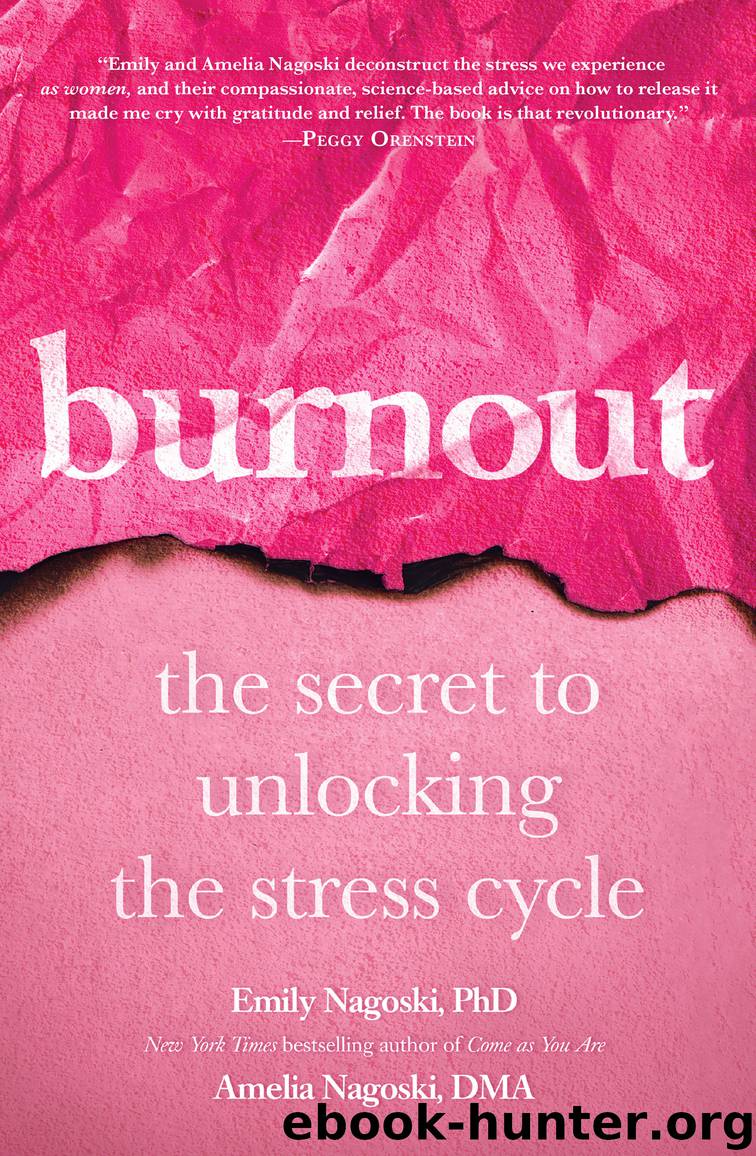Burnout : The Secret to Unlocking the Stress Cycle (9781984817075) by Nagoski Emily; Nagoski Amelia & Amelia Nagoski DMA

Author:Nagoski, Emily; Nagoski, Amelia & Amelia Nagoski, DMA
Language: eng
Format: epub
Publisher: Random House Digital
Published: 2019-03-26T04:00:00+00:00
Strategy 4: “Hi Body, What Do You Need?”
Finally, turn your attention away from the mirror and other people’s bodies, and notice what it feels like inside your body. Greet your internal sensations with the same kindness and compassion you practiced when you thought about the shape of your body.
When an infant squirms or cries because something about her body feels uncomfortable, the grown-ups have to figure out what the issue is, and we teach the infant what her body’s sensations mean.32 We coo, “Hi, honey, what’s wrong? What do you need? Are you hungry? Tired? Lonely? Oh, you’re hungry, huh?”
And the baby learns that that specific uncomfortable sensation means “hungry.” Another uncomfortable sensation means “wet.” A different uncomfortable sensation is “lonely.”
But even as she grows more familiar with her body’s internal sensations, she absorbs contradictory cultural messages about how she should feel about her body. The adults say things like “Look at that cute fat belly! I’m gonna zerbert that belly!” about her belly, and they also say, “Ugh, look at this fat belly, I’m so gross,” about their own belly.
Even before she can read or speak, she watches commercials and sees the magazine covers at the grocery store, and though she may never talk about it with any of the people in her life, she is absorbing the idea that her body is not already beautiful and that if she doesn’t make it beautiful, she doesn’t automatically deserve food or love or rest or health. And as a budding “human giver,” she learns that her body isn’t for her, it’s for other people. Other people’s pleasure, other people’s desire, other people’s acceptance or rejection.
Many of us have grown into world-class ignorers of our own needs, just as we were taught to be. We don’t even notice that we’re ignoring our needs. Our bodies are sending us all kinds of signals, but we live from the neck up, only attending to the noise in our heads and shutting out the noise coming from the other 95 percent of our internal experience.
Imagine that your body is the body of someone who needs your care, like an infant. It feels weird and wrong to a lot of us at first, but give it a try. Instead of just looking at your body to evaluate her well-being (we know that you can’t tell anything about a person’s health by the shape or size of their body), turn to her and ask her how she feels: “What’s wrong, honey? Are you hungry? Thirsty? Tired? Lonely?” She can definitely tell you, if you listen. You might have to stop what you’re doing, take a slow breath, focus on the sensation of your weight on the floor or the chair, and actually ask out loud, “What do you need?” You may receive the answer as an instantaneous knowing, or as a physical sensation you need to interpret, or as words in your mind. But she will give you an answer.
Though the details of her needs
Download
This site does not store any files on its server. We only index and link to content provided by other sites. Please contact the content providers to delete copyright contents if any and email us, we'll remove relevant links or contents immediately.
| Anthropology | Archaeology |
| Philosophy | Politics & Government |
| Social Sciences | Sociology |
| Women's Studies |
The Rules Do Not Apply by Ariel Levy(4957)
On the Front Line with the Women Who Fight Back by Stacey Dooley(4870)
The Lonely City by Olivia Laing(4798)
Bluets by Maggie Nelson(4548)
The Confidence Code by Katty Kay(4251)
Three Women by Lisa Taddeo(3425)
Not a Diet Book by James Smith(3411)
Inferior by Angela Saini(3311)
Confessions of a Video Vixen by Karrine Steffans(3301)
A Woman Makes a Plan by Maye Musk(3250)
Pledged by Alexandra Robbins(3170)
Wild Words from Wild Women by Stephens Autumn(3149)
Nice Girls Don't Get the Corner Office by Lois P. Frankel(3043)
Brave by Rose McGowan(2818)
Women & Power by Mary Beard(2767)
Why I Am Not a Feminist by Jessa Crispin(2748)
The Girl in the Spider's Web: A Lisbeth Salander novel, continuing Stieg Larsson's Millennium Series by Lagercrantz David(2716)
The Clitoral Truth: The Secret World at Your Fingertips by Rebecca Chalker(2713)
I Who Have Never Known Men by Jacqueline Harpman(2629)
